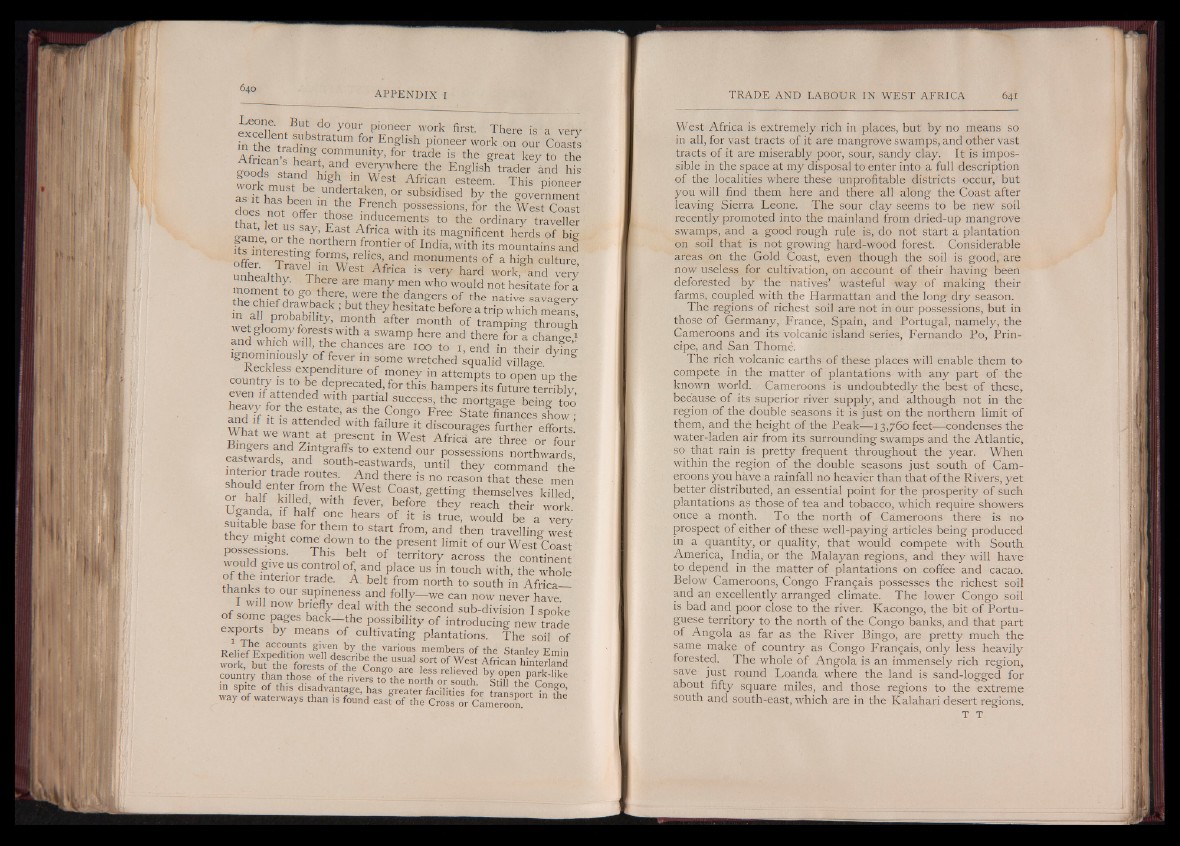
iBu^ do your pioneer work first. There is a verv
for English pioneer work on our C o S
n me trading community, for trade is the great key to the
ioodsans L i ' B * ' eV,e,7 where the English trader and his
wnrt *- u g , ln West African esteem. This pioneer
asithp^K undertaken, or subsidised by the government
f « not Fr! " Ch Possess'° „ s. for the West Coast
that let us S ? ° Sf ^oducements to the ordinary traveller
cmme or fb! 5 , ^ 1Ca Wlth itS magnificent herds of big
ittmteiestmJfr n ff°ntler ° f India, with its mountains and
offhr m ^ rellcs, and monuments of a high culture
u n h e a lt ir 'T b 111 ^ iS hard work> a " d 5 $
moment to J t ^ ^ mf n who would not hesitate for a
tW b S - d g u f rel.We? the dangers of the native savagery
the chief drawback ; but they hesitate before a trip which meanJ
m al probability, month after month of tramping through
2 whkhyvvii|eth a SWamp here and and which will, the chances are 100 to 1, ethnedr ei nfo rt hae icrh adnvigneP,-!
lgnomimously of fever in some wretched squalid village.
Reckless expenditure of money in attempts to open up the
country is to be deprecated, for this hampers its future terribly
even if attended with partial success, ‘the mortgage being too
and if it is attended with failure it discourages further efforts
What we want at present in West Africa are three or f^ur
eeaasTtwSadrdss" aanndd 1^sou^th -te0a sCtwXtaerid!,ds , °Uurn tPilo sstehsesyio ncso mnmorathnwd artdhse,
interior trade routes. And there is no reason that these men
o i0halfenknied°m 7 GSt w St’ gCtting themselves killed,
UUggaanaddaa , iiff ht al lff one hn ears ’ of it is tthrueey, rweoauchld thbee ira wvoerrkvsuitable
base for them to start from, and then travelling west
ey might come down to the present limit of our West Coast
possessions. This belt of territory across the continent
would give us control of and place us in touch with, the whole
SthraiSnEks fto o1u0rr sturapdinee- neAss abnedlt fforlolmy— nworet hc atno nsoouwt hn einv eAr fhraicvae—
I will now briefly deal with the second sub-division I spoke
of some pages back— the possibility of introducing new trade
exports by means of cultivating plantations. The soil of
West Africa is extremely rich in places, but by no means so
in all, for vast tracts of it are mangrove swamps, and other vast
tracts of it are miserably poor, sour, sandy clay. It is impossible
in the space at my disposal to enter into a full description
of the localities where these unprofitable districts occur, but
you will find them here and there all along the Coast after
leaving Sierra Leone. The sour clay seems to be new soil
recently promoted into the mainland from dried-up mangrove
swamps, and a good rough rule is, do not start a plantation
on soil that is not growing hard-wood forest. Considerable
areas on the Gold Coast, even though the soil is good, are
now useless for cultivation, on account of their having been
deforested by the natives’ wasteful way of making their
farms, coupled with the Harmattan and the long dry season.
The regions of richest soil are not in our possessions, but in
those of Germany, France, Spain, and Portugal, namely, the
Cameroons and its volcanic island series, Fernando Po, Principe,
and San Thomé.
The rich volcanic earths of these places will enable them to
compete in the matter of plantations with any part of the
known world. Cameroons is undoubtedly the best of these,
because of its superior river supply, and although not in the
region of the double seasons it is just on the northern limit of
them, and thé height of the Peak— 13,760 feet—-condenses the
water-laden air from its surrounding swamps and the Atlantic,
so that rain is pretty frequent throughout the year. When
within the region of the double seasons just south of Cameroons
you hâve a rainfall no heavier than that of the Rivers, yet
better distributed, an essential point for the prosperity of such
plantations as those of tea and tobacco, which require showers
once a month. To the north of Cameroons there is no
prospect of either of these well-paying articles being produced
in a quantity, or quality, that would compete with South
America, India, or the Malayan regions, and they will have
to depend in the matter of plantations on coffee and cacao.
Below Cameroons, Congo Français possesses the richest soil
and an excellently arranged climate. The lower Congo soil
is bad and poor close to the river. Kacongo, the bit of Portuguese
territory to the north of the Congo banks, and that part
of Angola as far as the River Bingo, are pretty much the
same make of country as Congo Français, only less heavily
forested. The whole of Angola is an immensely rich region,
save just ro.und Loanda where the land is sand-logged for
about fifty square miles, and those regions to the extreme
south and south-east, which are in the Kalahari desert regions.
T T